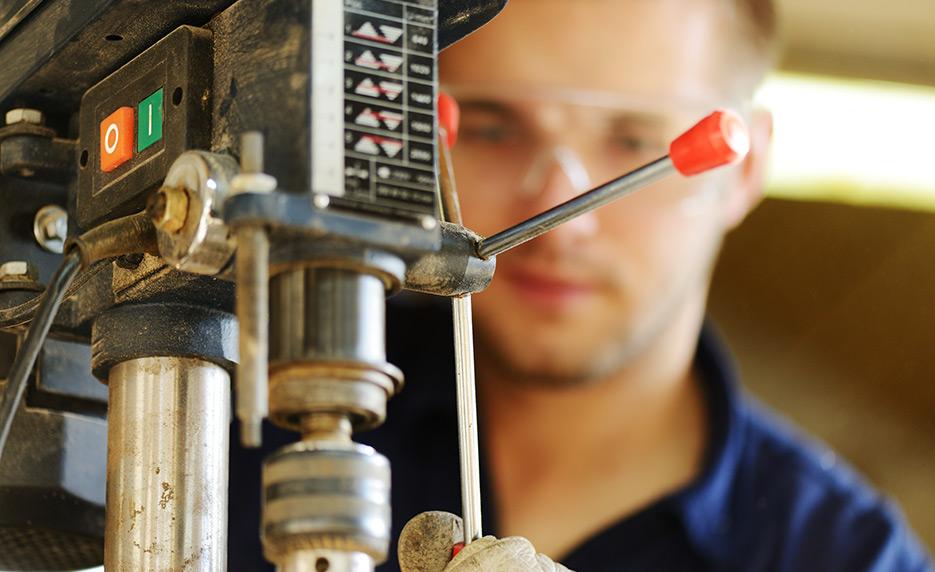Tool and Die maker
About department
description
Tool & Die Maker (Dies & Moulds) is a mechanical die making vocational trade. During class teaching, students are introduced to topics like how to conduct test runs with completed tools or dies; make adjustments as necessary; cut, shape, and trim blanks or blocks to specified lengths or shapes; file, grind, shim, and adjust different parts to properly fit them together; fit and assemble parts to make, repair, or modify dies, jigs, gauges, and tools; inspect finished dies for smoothness, contour conformity, and defects; lift, position, and secure machined parts on surface plates or worktables and so on. The trade is an important and career orienting in nature that provides many opportunities after its successful passing


Connect with us
Beneficial
- Courses under this: Training may include:
- Blueprint Reading and Interpretation
- Precision Measurement and Metrology
- Metalworking Processes (e.g., milling, grinding, turning)
- CAD (Computer-Aided Design) and CAM (Computer-Aided Manufacturing)
- CNC (Computer Numerical Control) Machining
- Tool Design and Engineering
- Die Design and Manufacturing
- Mold Making Techniques
- Heat Treatment and Surface Finishing
- Tool and Die Maintenance and Repair
- Mode: Offered in various modes including full-time apprenticeship programs and vocational training institutes. Some institutions may also offer part-time or evening classes.
- Eligibility Criteria: The eligibility criteria may vary depending on the institution and program. Generally, candidates should have completed at least secondary education (10th grade or equivalent) from a recognized board. Some programs may require prior knowledge of mechanical engineering concepts or technical aptitude.
- Admission Process: Admission processes may involve submitting an application form along with academic transcripts, attending an entrance exam or interview, and meeting any other requirements set by the institution.
- Areas of Employment: Graduates of Tool & Die Maker courses can find employment opportunities in various sectors, including:
- Manufacturing industries (e.g., automotive, aerospace, electronics)
- Tool and die shops
- Mold making companies
- Precision machining companies
- Engineering firms
- Government agencies
- Self-employment as independent contractors or entrepreneurs in tool and die making services.
- Courses under this: Training may include:
- Blueprint Reading and Interpretation
- Precision Measurement and Metrology
- Metalworking Processes (e.g., milling, grinding, turning)
- CAD (Computer-Aided Design) and CAM (Computer-Aided Manufacturing)
- CNC (Computer Numerical Control) Machining
- Tool Design and Engineering
- Die Design and Manufacturing
- Mold Making Techniques
- Heat Treatment and Surface Finishing
- Tool and Die Maintenance and Repair
- Mode: Offered in various modes including full-time apprenticeship programs and vocational training institutes. Some institutions may also offer part-time or evening classes.
- Eligibility Criteria: The eligibility criteria may vary depending on the institution and program. Generally, candidates should have completed at least secondary education (10th grade or equivalent) from a recognized board. Some programs may require prior knowledge of mechanical engineering concepts or technical aptitude.
- Admission Process: Admission processes may involve submitting an application form along with academic transcripts, attending an entrance exam or interview, and meeting any other requirements set by the institution.
- Areas of Employment: Graduates of Tool & Die Maker courses can find employment opportunities in various sectors, including:
- Manufacturing industries (e.g., automotive, aerospace, electronics)
- Tool and die shops
- Mold making companies
- Precision machining companies
- Engineering firms
- Government agencies
- Self-employment as independent contractors or entrepreneurs in tool and die making services.



